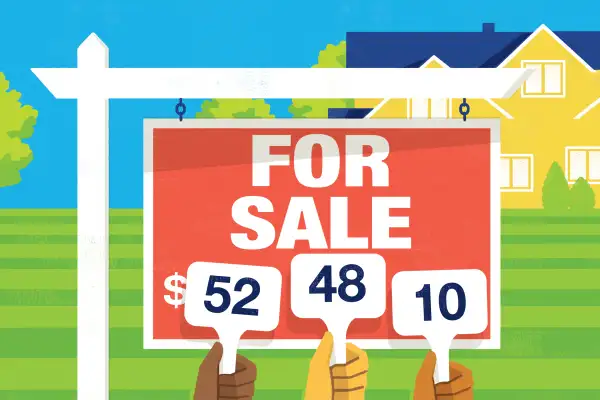Half of Homes Are Selling for Over Asking Price. Here's How to Decide What to Bid

Home prices have always been negotiable. Usually, that has meant buyers pushing sellers below their asking price. But lately, in a nation marked by a record-low supply of homes for sale, the opposite has been happening.
Consider: half of U.S. homes sold for more than their list price during the four-week period ending May 16, according to Redfin. That marks a record high since 2012, when the brokerage began tracking.
“The fact that 50% of homes sold for more than their list price shows just how intense and unshakable this competition is,” says Daryl Fairweather, Redfin’s chief economist. “As more people get clarity on what post-pandemic life is going to look like, they're willing to go well above asking price to snag the right fit for their needs.”
With an increase in bidding wars and an influx of cash-offers, in some places buyers don’t have much choice.
“If a house is fresh on the market and you want to get it you need to be aggressive, and that often means offering above asking price,” says Micki MacNaughton, a real estate agent at McEnearney Associates in Alexandria, Virginia.
Here’s how to decide if you should offer over a home’s list price in today’s market.
What price home can I afford?
This question may seem like a no-brainer, but it’s a crucial one to ask before making a high offer. If you stretch yourself too thin you could fall behind on your mortgage payments, which would put your home at risk of foreclosure.
Get pre-approved for a mortgage to determine what you can afford or use a home affordability calculator to get an estimate. Then, shop for homes that are listed at prices below your ceiling so that you have room to offer above the asking price when you find a house that you want to bid on.
Are there cash offers on the table?
Homebuyers who make all-cash offers nearly quadruple their chances of winning a bidding war, a recent Redfin report found. That’s in line with a May Zillow survey that found that 41% of listing agents said making an all-cash offer is the most effective strategy for buyers these days.
“I hate to use the phrase ‘cash is king’ because it’s so overplayed, but it’s true,” says Sarah Bandy, a real estate agent at Jason Mitchell Real Estate in Colts Neck, New Jersey. “Sellers prefer cash offers because they’re more likely to go through, since cash buyers can waive their financing contingency.”
If you can’t afford to make a cash offer, and you know that you’re going up against cash buyers when bidding on a home, offering above a seller’s asking price is a wise tactic, says Michael Lyons, a real estate broker and the owner of Lyons Realty Group in Hollywood, Florida. “A cash buyer will knock out a mortgage buyer every time if both buyers are offering a seller the same purchase price.”
Does your offer have contingencies?
Contingencies allow you to back out of a purchase if something goes wrong. The most common home buying contingencies include home inspection contingencies, home appraisal contingencies, financing contingencies (for mortgage buyers) and contingencies that say the buyer can renege if they can’t sell their current home first.
“An offer is a package deal,” MacNaughton says. “If your offer has contingencies, the seller is at a greater risk of the deal falling through, so a seller is going to want more money.”
Therefore, in addition to offering over asking price, you’ll want to limit your offer’s contingencies. “In this market having a home inspection contingency is going to kill your offer,” says Allison Fortini Crawford, a San Francisco real estate agent at Sotheby’s. Just be careful, some buyers who skip home inspections come to regret it when major defects appear later on.
Is the house properly priced?
Currently, a home that’s priced below its market value can fetch dozens of offers, Crawford says. Her advice to buyers: “Lean on your buyer’s agent to tell you whether a home is underpriced.” (FYI: Your agents will use recent sales of comparable homes, aka “comps”, to assess a property’s value.)
Furthermore, “you need an agent who knows not just the inventory but also other agents in their market, because some listing agents are notorious for pricing homes a little below market value to garner a large number of offers,” Crawford adds. Others are known for overpricing to generate buzz or appease overly optimistic sellers.
Lyons says that sellers who try to sell without an agent may undercut their home’s asking price unintentionally, which can present an opportunity for buyers to nab a deal. “Pricing a home is a science, and a lot of home sellers don’t know how to price their house on their own,” he says.
How would you feel if you lost this house?
Bidding on your dream home? Offering above list price can help you win it, Lyons says. He speaks from personal experience. “When my wife and I purchased our house, we walked into it and knew instantly that it was the home for us,” he says. “We knew we had only one opportunity to purchase it, so we offered $25,000 above list price, and it was the highest offer.”
The caveat? You still have to be realistic about how much home you can reasonably afford. “You don’t want to bid so high that you get the house but become house poor,” says Lyons.
Could you make up the difference if there is an appraisal gap?
Contracts for homes that are sold above list price are more likely to face an appraisal gap (an appraisal that is lower than your offer), MacNaughton says. Indeed, according to a monthly report by the National Association of Realtors 15% of contract terminations in March were caused by appraisal issues, up from 3% in April 2020.
“The value of a home is in the eye of the beholder, but it’s also only worth what your lender is willing to loan you,” says MacNaughton. And your lender won't give you more than a certified appraiser says the home is worth.
That’s why Bandy says it’s important for buyers to have a game plan for how they’d handle a low appraisal. “Let’s say you offered $900,000 for a home and it appraised for $850,000. Are you willing to pay the difference?”
One way to resolve a low appraisal, Crawford says, is to reduce your down payment so that you can come up with the cash to cover an appraisal gap.
The bottom line: “It’s tough out there for homebuyers, so you may have to significantly offer above list price to have your offer accepted,” says MacNaughton.
How much over asking price should I offer?
According to Redfin’s data covering the four-week period ending May 16, on average homes sold for 1.7% above list price.
Still, with so many buyers out there competing for homes, your best approach is to make your highest offer from the get-go, Bandy says. “A lot of sellers don’t want to make counter-offers,” she says. “They want to choose the best offer that they receive” and not deal with the headache of going back and forth with a buyer over the purchase price.
More from Money:
Buying a House in Cash Can Save You Thousands, and You Don't Have to Be Rich to Pull It Off
In the Competitive Coronavirus Housing Market, This Loophole Is Making It Easier to Buy a House
